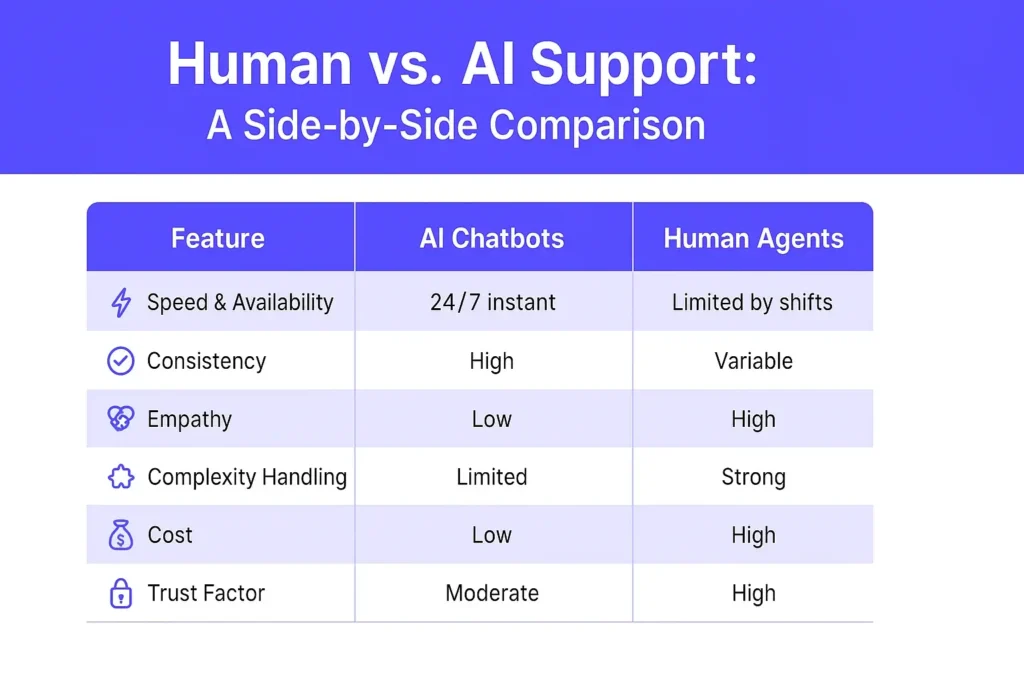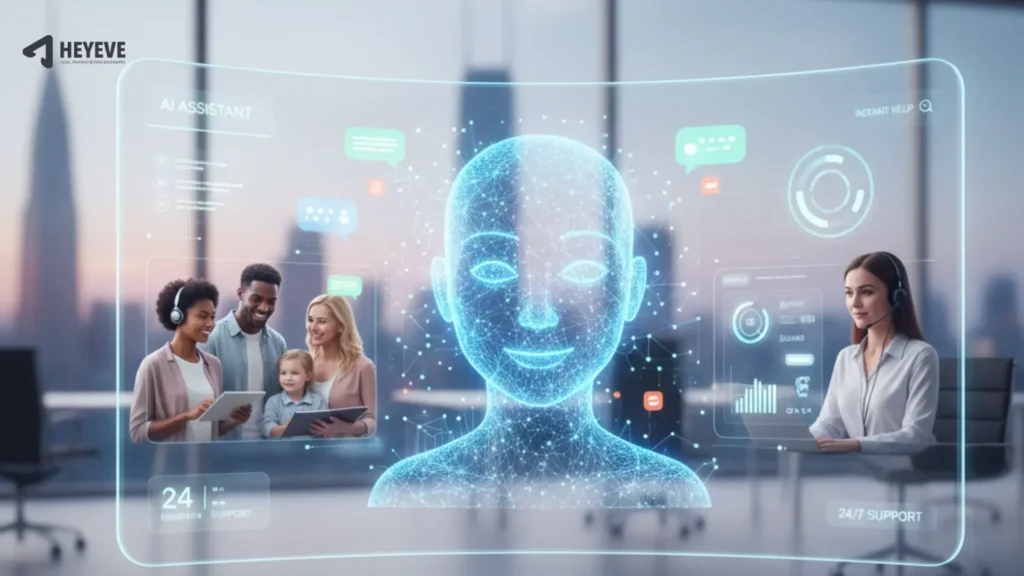Have you ever waited on a phone line to be called to speak with a customer care agent, only to wait for the next 45 minutes in the queue? Frustrating, right? That is what the companies are attempting to resolve using AI in customer service.
Chatbots would be fast and available 24/7, and cheaper. However, there is a twist here: 50 percent of customers will still want to speak with a human being PwC study, 2023. Why? Human beings are empathetic, creative, and judgmental; thus, AI will not be able to entirely substitute them. It is not actually AI versus humans, then. It is how do we take the best of both and leave behind the rest? Let’s dive in.
Where AI Shines in Customer Support?
The areas where AI in customer support works most effectively are those that are problems that a human can not address at a large scale. These strengths can be seen in how AI is critical to business today because it reduces the time it takes to respond to customer demands and deliver relevant information.
Speed and 24/7 availability
AI chatbots make sure that customers do not stand in line. Having 24/7 AI-driven customer service assistants, the businesses would provide immediate response across different time zones, generating satisfaction and less frustration.
Handling repetitive tasks at scale
Repetitive questions that have large volumes, such as tracking of orders, returns, or password resets, are dealt with by AI. This leaves the human agents to work on complex cases and to work with multiple customer queries. An AI for repetitive customer queries would be cost-effective and efficient.
Cost-efficiency and scalability
Companies employing AI in customer service save on operations because simple requests are automated. As well, AI applications scale easily, handling thousands of conversations simultaneously without recruiting new personnel.
Error-free execution and consistency
AI also means that a customer has full and dependable customer support without errors or exhaustion, as humans do. All responses are in accordance with brand standards, which provide customers with consistent channel experiences.
Data collection and customer insights
AI is not only an answer, but it also learns. Using dialogue, AI customer service data mining options can assist companies in personalizing service, anticipating problems, and enhancing subsequent engagement.
Related: https://heyeve.ai/blogs/ai-chatbot-for-customer-support/
Where Humans Still Matter Most in Customer Support?
Artificial intelligence is mighty, yet it possesses a limitation. Customers want the human touch with customer support when they are required to involve their feelings, trust, and intricate decisions. This is where one could never substitute people:
Complex, sensitive, or high-emotion issues
Upon failure, losing, or having an urgent issue, customers require a sympathetic touch, rather than constraint algorithms. Humans offer emotional intelligence to the service experience, listening attentively and solving problems that artificial intelligence may not comprehend completely.
Empathy and relationship-building
Artificial intelligence is capable of processing information, but not making a real connection. Human beings are even more skilled at customer care courtesy prompted by empathy, care, assurance, and warmth that build loyalty and trust in the long run.
Judgment and exception handling
Not every case fits a script. Humans offer judgmental customer care, where they make flexible decisions, in circumstances not covered by policies, that are unique or involving complexity. Such flexibility keeps the customers happy, where AI fails.
Guiding customers through complex journeys
Some customer experience paths, such as financial products, care, technical onboarding, etc., need human assistance. Travel agents give customers special care with complex trips, to make the journey easier and less stressful for customers undergoing arduous procedures.
Human vs. AI Support: A Side-by-Side Comparison

Heyeve.ai provides virtual reality courtroom training, practice mock trials, receive real-time feedback, and learn the law in virtual reality.
The Power of the Hybrid Approach
By combining AI in customer support with human agents, the businesses can have the best of both. AI is not a person-replacement tool, but rather an assistant that yields better service quality and efficiency.
Efficiency without compromise
AI takes up routine work, and overseas human people concentrate and enter into meaningful communication. The balance generates efficient customer support systems, which save time without compromising on customer satisfaction.
Real-time AI assist for human agents
Customer support departments solve their problems more quickly with the help of AI tools that support live operators. Artificial intelligence will propose solutions, bring up data on demand, and minimize handling time, enabling human operators to push it a notch higher without feeling stressed to provide optimal solutions.
Seamless AI-to-human handoffs
There is nothing like being stuck with a bot, especially when the customer is frustrated. Having a powerful hybrid customer support model enables an easy switch between chatbot and a human so that the customers feel listened to and treated at every turn.
What Customers Actually Want: AI vs. Human Preferences?
Research indicates that AI in customer service increases speed, though trust continues to be directed to human beings. The preferences of the customers would be based on the nature of the issue, their age category, as well as their income level.
- One out of two customers still would use a human to solve their problems.
- The younger generation of millennials and Gen Z regard AI chatbots more than the elderly.
- Customers who have high incomes feel more satisfied with AI support, but they also appreciate the fact that human agents can show their empathy.
- One human characteristic that cannot be completely recreated by AI is trust and empathy.
As brief as that, there are two things that customers want: the level of AI speed and the understanding of human support, and those businesses that offer both computing power and human compassion are ahead of the curve.
Suggested: https://heyeve.ai/blogs/ai-in-marketing-and-sales/
Best Practices for Combining AI and Human Customer Service
Integrating AI in customer support with human services will have to be approached intelligently. Companies that act by thinking and planning thrive by reaping the benefits of AI without relying on unbearable cold machine knowledge at the cost of a human being. Here’s how to make it work:
Map the customer journey first
Predict the customer support journey of your company by mapping out all actions needed before chatbots or AI agents are introduced. Here, outside insights are how fast and how empathetic it is, where you should consider AI a fact.
Segment support by complexity
Not every issue needs a human. Redirect complex or emotional problems to human-trained agents, and use AI to handle more straightforward customer service, such as frequently asked customer questions or order tracking.
Use data to refine AI’s role
AI shines when it learns. Monitor conversations and process customer service data using AI to locate areas that lack, make predictions, and personalize interactions more.
Define clear AI-to-human escalation paths
Customers must also feel able to walk away with a bot, open smooth escalation options within AI customer service to get the system to transition to human service when necessary.
Align teams around customer needs, not channels
Forget silos. Train the work of teams where the main goal of AI-powered support agents and human support agents is the solution of customer problems, regardless of the platform.
Pilot, test, and scale intentionally
Do not start implementing AI everywhere at once. Begin small, test pilots, get feedback, and gradually increase AI-human hybrid support with time to have smooth adoption.
Why Businesses Are Adopting AI in Customer Support?
There is no secret; companies globally are competing to incorporate AI in customer care. This is just simple because AI is economical, scales quickly, and takes no leave.
- Cost savings: IBM documents that customer service costs can be saved by up to 30% when using AI chatbots in the business.
- Always present: AI offers round-the-clock customer services that are 24/7 and not limited by sick leave, holidays, etc.
- Reduced mistakes: AI provides uniform, mistake-free answers as opposed to human beings, who might become fatigued or distracted.
- Scale: AI scalability allows accommodating thousands of conversations simultaneously, which is not possible when there is a human-only team.
In the case of businesses that need to reduce expenses and provide better service to more clients, AI is the clear option. That does not, however, exclude human beings.
Finding the Right Balance for Your Business
Winning the game is not about humans or AI: it will be a mixture of both. A hybrid system of customer service makes artificial intelligence (AI) solve mundane tasks, and human service agents concentrate on empathy and the ability to solve problems.
To find an equilibrium here, then do the following:
- Apply AI to those problems that are mostly urgent (FAQs, update on order, password resetting, etc.).
- Hold on to people to be sympathetic and trusting (high-value, emotional, or complex cases).
- Test and measure outcomes continuously so that you can know when to make a change in your strategy.
Business-friendly practitioners who have this moderated AI-human encouraging framework experience the best of both worlds: quicker service, reduced cost, and satisfied customers.
Are you interested in changing your legal education? Go and try Heyeve.ai today and begin to master courtroom skills.
Let’s Begin!
Final Verdict: AI + Humans = The Future of Customer Support
The future of AI in customer support is not one about killing individuals; it is one of collaboration. Responsibilities of humans, such as empathy, trust, and solving complex problems, are scarce and are only capable of humans, whereas the responsibility of AI is speed, scale, and cost-effectiveness.
Their winning business will be the one able to merge automation with the human touch and to provide customer experiences that are as fast as well as deep. That is, it is not a question of AI versus humans, but rather it is AI alongside humans at work.
Frequently Asked Questions (FAQs)
What is the difference between AI and human customer support?
AI provides instant and automatic answers to simple tasks, whereas human beings address the complex, sensitive, and emotional activities, demanding judgment, empathy.
Will AI replace human customer service agents?
Not. AI will displace repetitive, low-value tasks but not high-value, emotional interaction or complex interaction, which is the responsibility of human agents.
When should I use AI versus a human agent?
AI can be used for FAQs, order-tracking, and fast responsiveness. Escalations, complaints, and building long-term relations with customers should be done through humans.
Can AI improve customer satisfaction?
Yes, with human assistance. Customers value the speed of the response given by AI, but also need empathy and trust to be provided by humans.
Can AI reduce customer service costs?
Absolutely. The AI is reported to save businesses as much as 30 percent when used in the customer support system.
What is the first step to creating a balanced AI-human support model?
Begin by mapping your customer journey. Determine in which functions speed is most important (AI) and in which functions empathy is the most important (human).


